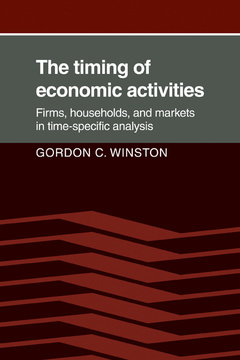Description
The Timing of Economic Activities
Firms, Households and Markets in Time-Specific Analysis
Author: Winston Gordon C.
This study introduces 'time-specific' analysis of economic processes.
Language: English
Subject for The Timing of Economic Activities:
Approximative price 40.18 €
Subject to availability at the publisher.
Add to cart
Publication date: 08-2008
360 p. · 15.2x22.5 cm · Paperback
360 p. · 15.2x22.5 cm · Paperback
Description
/li>Contents
/li>
This study introduces 'time-specific' analysis of economic processes. Economic processes are conventionally analysed from one point in time to another over a series of time units - days, weeks, or years. By contrast, these time-specific models focus on the temporal character of events within the unit time - their timing, duration, and sequence - utilizing the information that is lost in the macroscopic time perspective of standard economic theory. What time-specific analysis reveals are economic and technological characteristics of goods and services - prices and cost behaviour and temporal mobility or immobility within the unit time - that affect capital productivity and its utilization, optimal schedules of production, work, and consumption, least-cost methods of producing time-shaped outputs, and efficient welfare-maximizing behavior in time-specific, including peak-load, markets.
1. Introduction; 2. Timing, information loss, and unit time in economic analysis; Part II. Time-specific analysis of production: 3. Modeling the time-shape of processes, technology, and prices; Time-shaped costs: optimal scheduling of storable production; 5. Time-shaped output: least-cost production of perishable peak-load products; Part III. Applications of time-specific analysis: 6. Shephard's dilemma: duality and the process of production; 7. Factor intensities, capacity, and the Leontief paradox: Part IV. Time-specific analysis of household activities: 8. Modeling the time-shape of work and consumption: the optimal household schedule and the value of time; 9. The anatomy of household activities: goal and process; work and home production; capital and self-control; Part V. Time-specific markets: 10. A theory of time-specific markets: generalized peak loads; 11. Welfare and distortions in time-specific exchange; Part VI. Postscript: 12. Time-specific analysis of nonrhythmic events: relational exchange and the role of repetition.
© 2024 LAVOISIER S.A.S.

